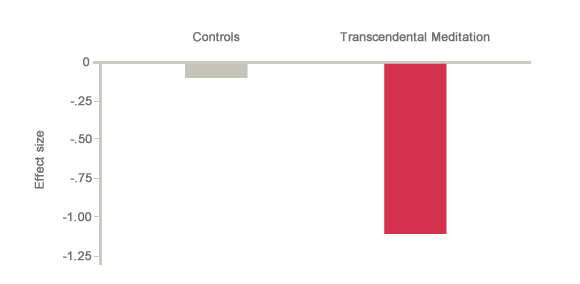
Depression, Heart Disease, and Transcendental Meditation
The feelings of hopelessness and low self-esteem we tend to associate with depression seem far removed from things like cholesterol and hypertension. It is tempting to put these very serious problems in separate categories and act as though they have no relationship.
But it is now well established that depression increases both the risk and the overall incidence of heart disease. To make matters worse, the problem is bi-directional: depression increases heart disease and heart disease has also been shown to cause higher rates of depression.
Depression can increase the risk of a heart attack and development of coronary artery disease. The continued presence of depression after recovery from a heart incident can increase the risk of death. In addition, negative lifestyle habits associated with depression – such as smoking, excessive alcohol consumption, lack of exercise, poor diet and lack of social support – interfere with the treatment for heart disease.
Depression has been proven to be a such a risk factor in cardiac disease that the American Heart Association (AHA) has recommended that all cardiac patients be screened for depression. Women are diagnosed with depression about twice as often as men. For women it ranks among the top ten CVD risks.
Several research studies suggest the TM technique can help. Two were specifically conducted on individuals 55 and older at risk for cardiovascular disease. Study participants were randomly assigned to the TM program or health education. Both groups were assessed for depression. After a period of 9 to 12 months, the TM practitioners showed significant improvement compared to the controls. Those with the most serious depression showed an average reduction of 48% in symptoms.
In a study on Transcendental Meditation and congestive heart failure, individuals showed improvement in quality of life and mental health in addition to improvements in physical capacity of heart functioning, as shown by a clinically significant reduction in depression in the Transcendental Meditation practitioners.
This shows that adding TM practice to the patient’s routine as an effective mind-body intervention program to usual medical treatment programs results in significant improvements in both physical and mental health in patients with heart failure. This is a remarkable medical discovery, and it is very easy to implement on a widespread basis.
Other TM studies on a variety of groups—adolescents, veterans with PTSD, industrial workers and patients suffering from bipolar disorder—have also shown that the TM practice produces good results.
Norman Rosenthal is a clinical professor of psychiatry at Georgetown Medical School and conducted research at the National Institutes of Mental Health. “We often have to try several different medications or treatment approaches before we find the right mix. I am suggesting that TM should be part of that mix….” Dr. Rosenthal also stated, “If TM were a new prescription drug, conferring this many benefits, it would be a billion-dollar blockbuster."
While the TM program has shown great success in this area, it may not reduce every woman’s depression by itself, however it is the kind of adjunct therapy that women with or without heart disease can embrace knowing it has something to offer to both mind and heart.
Decreased Depression
Through Transcendental Meditation
Patients suffering from post-traumatic stress problems who learned the Transcendental Meditation technique showed significant reduction in depression after four months, in contrast to others who were randomly assigned to receive psychotherapy.

Reference: Journal of Counseling and Development 64: 212–215, 1985.
Other relevant published research:
- 40-55% decrease in symptoms of depression
Military Medicine 176 (6): 626-630, 2011 - 30% increase in satisfaction with quality of life
Military Medicine 176 (6): 626-630, 2011 - Journal of Counseling and Development 64 (1986): 212–215.
- Journal of Humanistic Psychology 16(3)(1976): 51–60.
- Gedrag: Tijdschrift voor Psychologie [Behavior: Journal of Psychology] 4 (1976): 206–218.
- Brooks J.S., et al. Transcendental Meditation in the treatment of post-Vietnam adjustment. Journal of Counseling and Development, 64:212–215, 1985.
- Kniffki C. Tranzendentale Meditation und Autogenes Training- Ein Vergleich (Transcendental Meditation and Autogenic Training: A Comparison). Munich: Kindler Verlag Geist und Psyche, 1979.
- Geisler M. Therapeutiche Wirkungen der Transzendentalen Meditation auf drogenkonsumenten (Therapeutic effects of Transcendental Meditation on drug use). Zeitschrift fur Klinische Psychologie 7:235-255, 1978.
- Ferguson P.C., et al. Psychological Findings on Transcendental Meditation. Journal of Humanistic Psychology 16:483-488, 1976.




